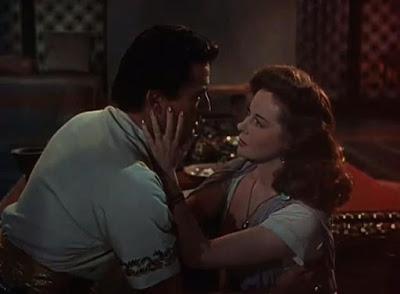Format: DVD from NetFlix on rockin’ flatscreen.

I’m not going to pretend that I have a fondness for biblical epics, because I don’t. Sure, there are a few that I think are good and worth watching, but in general, they leave me cold. They tend toward the preachy and also tend to treat Old Testament stories not only as actual history, but as something edifying and filled with moral value. The truth is that I find the majority of the OT to be morally suspect at best and hideously immoral at worst (and in general). So it is with David and Bathsheba, a Hollywood-ized version of a story out of the second book of Samuel. We’re supposed to (I assume) learn about mercy, when this is a really nasty story once you dig even a little below the surface.
As the title suggests, this is the story of King David and Bathsheba. The story goes like this—King David (Gregory Peck) and his troops are fighting a battle. Placed in danger, David is convinced to retreat to Jerusalem. Before he goes, he talks to one of his higher ranking soldiers, Uriah (Kieron Moore). Uriah is recently married, but he hasn’t let that change what he thinks is his destiny—to die gloriously in battle for the benefit of his king.
Back in Jerusalem, David has a verbal battle with Michal (Jayne Meadows), his first wife with whom he has an antagonistic relationship. He admits to her that the only reason he has maintained their troubled marriage is that he needed her with him to gain the support of some of the tribes of Israel. Since she is the daughter of the former king Saul, David needed her as the link to power. That night, David walks on his balcony and sees a beautiful woman bathing. That woman is Bathsheba (Susan Hayward), who happens to be the wife of the aforementioned Uriah.
So, since David is the king and can have plenty of wives, he decides he’d like to meet Bathsheba. He learns that her marriage to Uriah is essentially loveless—they have spent only a couple of days together despite being married for seven months and she’s not really that bothered by it. In fact, she’s tried to catch the eye of King David before, and when she heard that he was in town, she figured he’d walk on his balcony, so she specifically bathed in front of him to get his attention. While it’s clearly against the Law of Moses, David and Bathsheba decide that they are going to embark on a torrid affair, which is exactly what they do.
David and Bathsheba must think that everyone else is pretty dumb, because they’re not at all discreet or casual about their relationship. They’re seen together constantly, and evidently don’t care too much if their servants find out about Bathsheba’s infidelities. Keep in mind that it’s her infidelities that are important here—that’s a capital offense in this time, at least for women. David, as the king, as a bit more leeway. Anyway, eventually Bathsheba gets pregnant and since Uriah isn’t around, there’s really only one candidate for that. To protect himself, David orders his general Abishai (the awesomely-named James Robertson Justice) to send Uriah to the heaviest fighting and then pull back so that Uriah will be killed. Then, after a month’s mourning, Bathsheba will be free to marry him.
But, of course, in this world you can’t hide this kind of stuff from the Big G, which means that Israel falls victim to drought caused by the sin of David. Eventually, David has to atone for his wrongdoing. In this case, that means confronting the Ark of the Covenant (which looks quite a bit like what was used for the model in Raiders of the Lost Ark). We’re given a glimpse of its power when a man dies from touching it even though he touched it to stop it from falling. So what will happen when David confronts his terrible sin? And what will happen to Bathsheba?
Like I said at the top, my problem here is mainly with the tone. The thrust of the story is that all of what happens does so because of the wrath of God—he’s punishing David for the sins that he has committed. The problem with this is that everybody else seems to get punished for what David does. It’s the shepherds who lose their flocks to the drought, and rather than David being punished directly, his child with Bathsheba dies instead. This is fair? This is just? David, despite his actions, benefits from being God’s favorite—and for the favorite there are evidently special rules. All he really needs to do is be sad that he sent Uriah to be killed off, and everything’s okay. Everyone around him with the exception of Bathsheba is disposable. As long as David gets what he wants, it’s all good.
Beyond that, the best thing going here is the costuming and sets. Those are lush and elaborate, and that’s pretty interesting. But the story itself is pretty lackluster. The romance is tepid at best, and as far as biblical stories go, the story of David and Bathsheba isn’t one of the interesting ones. Oh, it’s not the most morally repellent—the story of Lot and his daughters would rank high there, as would the story of Jephtha—but it’s still pretty morally iffy.
I honestly don’t know if the cast of David and Bathsheba was sleepwalking through this or if I was just so bored by the story that I sleepwalked through watching it. In any case, I found it listless and lackluster. It’s fair to think that might be my own predilections.
Why to watch David and Bathsheba: If you like biblical epics, this is one.
Why not to watch: Honestly, it’s a pretty dumb story.
